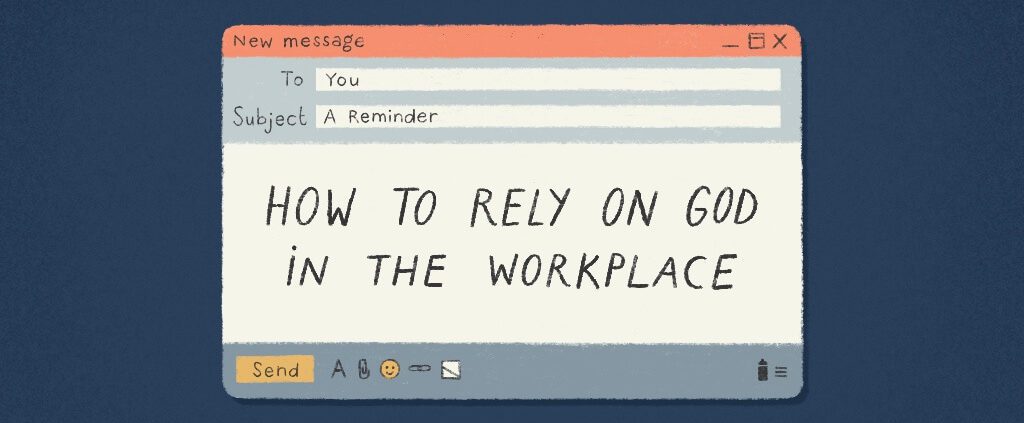How to Rely on God in the Workplace
Written by Andrew Laird, Australia
Andrew works for City Bible Forum and is the National Manager of their Life@Work program, which aims to help Christians connect their faith with their daily work. He is the author of two books about work, including Under Pressure: How the Gospel Helps Us Handle the Pressures of Work. He is the former Dean of Ridley College’s Marketplace Institute, and has a background in radio journalism. He lives in Melbourne, is married to Carly and has three children.
You don’t have to be in the workplace for too long before challenges come your way. A difficult colleague, a demanding boss, an overwhelming workload. Such difficulties can leave us feeling under enormous pressure.
I must admit my reaction to such challenges is to start thinking about how I can solve the situation. Whether it’s finding a new job, confronting a colleague, or strategies to manage a workload, my first question usually is, “What can I do?”
But in 2 Corinthians, the Apostle Paul shows us another way. He describes the challenges he is facing as having placed him “under great pressure, far beyond our ability to endure” (2 Corinthians 1:8). He was being persecuted by those outside the church (2 Corinthians 11:23-27) and criticised by those within (2 Corinthians 11:6-12).
And in the face of these hardships, he makes a startling comment: “This happened that we might not rely on ourselves but on God, who raises the dead” (2 Corinthians 1:9).
Each hardship, challenge, and “great pressure” can be a reminder of our humanity, our limitations, our need for the help of others. Most importantly, hardships steer us to rely on God, and to ask, “What can God do?” instead of “What can I do?”
As I read this verse, I found myself wondering, “Practically, what does it mean to ‘rely not on ourselves but on God’ in everyday life?” It’s such an easy thing to say, but what does it look like to live in reliance upon God, and especially in the workplace, where we spend most of our time?
Here are three suggestions:
1. Prepare to be “unmasked”—admit you don’t know, and ask for help
One way we demonstrate our dependence upon God is by relying on those around us. Our obedience to God includes bearing each other’s burdens (Galatians 6:2), which means allowing others to bear ours as well.
A simple way of doing this is by admitting to our colleagues when we don’t know, or need help, with something. This can be a very difficult thing to do in individualistic cultures, where we can feel shame associated with asking others for help. But we need to recognise God has not made us to be self-sufficient, and this is not the way many other cultures operate either.
A posture of relying on God frees us from the burden of being self-sufficient and the fear of being shamed.
As a friend who works in patient rehabilitation once shared with me, regaining independence is often the goal of rehabilitation in cultures with an ingrained individualistic mindset. But in cultures that are more communal-minded, a key goal in helping a person recover from their injury is to teach the community how they can care for this person when they’re weak—this is interdependence.
So, know that you are fighting against our individualistic culture when you ask for help (that’s why it can be hard to do!). But know also that your interdependence in daily life is a powerful witness to your dependence upon God.
2. Allow others to take responsibility
Another way we can express our dependence is by allowing our colleagues to take responsibility for tasks that we would ordinarily do ourselves . . . even if they don’t do it the same way we might!
A great temptation for me is to try and do everything myself in the workplace so that it can be done the way I like it, only to end up overwhelmed by work. I know these thoughts stem from my desire to always be in control.
But isn’t the hallmark of the Christian faith giving up control and entrusting our lives into the hands of a sovereign God? It doesn’t follow that we trust in a sovereign God if we are known by our colleagues as a micro-manager!
When we recognise our limitations, our need to rely on others, and that we worship a sovereign God, we will be quick to allow others to help us with our work, or for them to take responsibility for a certain part of a project, without feeling the urge to do everything ourselves.
I’ve lost count of the number of times someone has done something differently than me, in a way that I would have never thought of doing, and it was more useful, efficient, or helpful. Things may not turn out the way we imagine, but we’ll be surprised to see how things can work out differently and still turn out well when we let others take the lead. And we get to learn from others, too!
3. Pray without ceasing
Prayerfully asking God for help is the chief practical way to rely on Him, though sometimes this is suggested to us as the only way, which is why I’ve shared other practical ways we can respond. Nevertheless, I want us to consider this point last so we can let the thought linger with us.
Leaning into God in prayer in everything is how we rely on Him. A practical outliving of this would be when we pray without ceasing (1 Thessalonians 5:17), seeking His counsel before undertaking any venture, asking for His wisdom before making decisions, and calling for His help in challenging times.
When we’re quick to recall the kind of wisdom He offers us—and He is eager to give it to all who ask (James 1:5)—we will want to keep praying continuously. He is the one who makes our paths straight when we lean on Him (Proverbs 3:5-6). All His ways are perfect and right (Deuteronomy 32:4; Psalm 18:30).
Reminding myself of these truths helps motivate me to pray as a first, rather than last resort! God is the best boss and colleague to invite into our everyday lives, He’s got the know-how and He’s more than willing to help.
If you have come to the end of this list and still feel unsure as to how this truth stretches into all the details of your daily work life, you’re not alone—I feel that too.
What I’ve begun to do is to ask God to continue to show me what it means, in each moment of each working day, to rely on Him and not myself. And maybe that is the starting point in this whole attempt to rely on God and not us, to simply say outright, “I don’t know how to do this, God. Would you help me to learn what it means to rely on you?”
This article was originally published on City Bible Forum. This version has been edited by YMI.














Thanks for this practical article